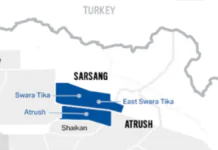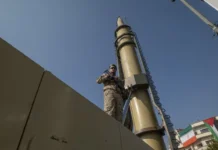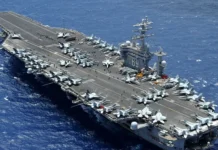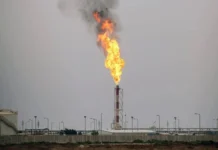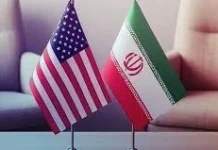Tishwash: The Iraqi government has granted Chinese companies oil investments to develop fields over five years.
Reuters reported on Monday that the Iraqi government has granted numerous Chinese companies investment opportunities in the oil sector to increase production and develop fields over the next five years.
“Chinese companies offer competitive financing, reduce costs by using cheaper Chinese labor and equipment, and are willing to accept lower profit margins to win long-term contracts,” the agency quoted Ali Abdul Amir of the state-run Basra Oil Company as saying, as monitored by the “Wadih” platform.
He continued, “These companies are known for their speedy project execution, strict adherence to timelines, and high capacity to operate in areas facing security challenges. He added that doing business with the Chinese is much easier and less complicated than with Western companies.” link
Tishwash: A government initiative to diversify the economy and boost investment confidence.
Throughout history, gold has maintained a cultural symbolism and enduring economic value. To leverage this status for the benefit of the national economy, Prime Minister Mohammed Shia al-Sudani launched an initiative to transform Baghdad into a regional center for the gold and jewelry industry and trade. The initiative, approved by the Ministerial Council for the Economy, aims to capitalize on Iraq’s natural resources in gold and precious metals, regulate the local market, attract investment, and build value chains within the country.
strategic move
In this regard, economic and banking expert Dr. Nabil Rahim Al-Abadi explains that amid accelerating global economic fluctuations, demand for gold as a safe haven has surged. He explains that Prime Minister Mohammed Shia Al-Sudani’s initiative to open the door to gold investment with strong government support and guarantees underscores the government’s strategic direction to keep pace with global trends.
Al-Abadi added, in an interview with Al-Sabah, that gold is not just a valuable commodity, but has turned into a major investment tool in the portfolios of financial institutions and individuals alike, especially with expectations of its price rising to $3,500 per ounce by the end of this year, according to reports from Goldman Sachs Bank.
investor confidence
He pointed out that global markets are witnessing a fundamental shift in dealing with the “yellow metal,” especially with the rise in inflation and the decline in investor confidence in traditional currencies. He emphasized that during major crises, such as the Corona pandemic and the Russian-Ukrainian war, the price of gold rose by percentages ranging between (19-24)%, which strengthened its position as one of the most important hedging tools against economic risks.
Successful experiences
He said that leading experts, such as Peter Schiff of Europak, have warned that the world is facing the largest wave of inflation in modern history, which has prompted central banks around the world to increase their gold reserves. He pointed out that the most successful model that Iraq can adopt is the system of gold exchange-traded funds (ETFs), which provide high liquidity and significantly reduce storage and insurance costs. The Gold Shares Fund, for example, is the largest gold fund in the world, managing assets amounting to hundreds of billions of dollars, making it an ideal model that can be applied to the Iraqi market.
Golden Certificates
He added that it is also possible to benefit from the experience of gold certificates offered by banks such as Banque Misr and Mashreq Bank, which allow investors to own gold without the need to store it physically, with full guarantees from the Central Bank, adding that there is a digital gold model, launched by Saudi banks such as Al Rajhi, which allows the buying and selling of gold with a minimum of (10) grams via phone applications, making it accessible to small investors.
strict regulatory framework
When asked how Iraq could transform gold into an economic engine, the economist and banking expert explained that for the initiative to succeed, a strict regulatory framework must be established, including the establishment of an independent oversight body to oversee the quality of gold in circulation and the adoption of a transparent pricing mechanism that reflects global prices.
banking infrastructure
He emphasized the importance of developing an integrated banking infrastructure, including digital platforms for the immediate buying and selling of gold, along with tax exemptions to encourage storing gold in bank vaults rather than at home. He also proposed providing low-interest gold-backed loans, allowing businesspeople to benefit from price fluctuations without significant financial risk. He also emphasized the importance of building central vaults secured according to global security standards, which would be a crucial step in ensuring investor confidence.
Challenges and risks
Al-Abadi believes that there are challenges that cannot be ignored, most notably: price fluctuations, as the difference between the buying and selling price may reach (15%) in some unregulated markets, which requires imposing a regulatory ceiling not exceeding (1.5%), in addition to the risks of home storage, which increases the possibility of theft, which requires incentives to encourage storage in bank vaults. He also believes that the trading of fake gold is a constant risk in emerging markets, and requires obligating banks to issue guarantee certificates of purity.
gradual strategy
He noted that Iraq could become a major player in the regional gold market if it follows a gradual strategy, starting with building the necessary infrastructure within six months, then launching digital platforms and certificates of deposit within a year, and finally linking the local market to global gold exchanges within three years. He noted that the success of this initiative will depend not only on government support, but also on tripartite cooperation between the government as a guarantor, banks as a carrier, and investors as a key driver. In times of crisis, gold becomes a currency of trust that can contribute to strengthening the Iraqi economy and integrating it into the global market with steady steps, rather than just being an investment.
fundamental reforms
For his part, economic expert Asaad Al-Rubaie said: “The current government has launched a series of steps to diversify financial revenues away from oil by implementing a package of fundamental reforms targeting non-oil revenues, including reforming the tax system by expanding the tax base, automating collection, combating tax evasion, supporting the private sector, and establishing strategic projects such as petrochemical plants and paving and expanding strategic roads, which represent a very important part of the success of any economic renaissance.” He indicated that the recent approval by the Ministerial Council for the Economy to establish the International Gold City in Baghdad comes in line with the objectives of the government program to support industrial development and provide job opportunities.
Diversifying the economy
Al-Rubaie, speaking to Al-Sabah, considered launching such an initiative to localize the gold industry an important tributary to diversifying the economy away from oil, adding an important and strong pillar to the Iraqi economy and consolidating Iraq’s economic position on the global map. It may be the first step in presenting Baghdad as a regional economic center, representing an excellent destination for global capital to invest in, and offering it as a competitor to other countries and cities such as Dubai, Istanbul, and others.
Integrated city
Al-Rubaie explained that the project aims to launch an integrated city with international standards for the gold industry, including units for gold and jewelry crafting, training and qualification centers for national cadres, and advanced markets and a stock exchange for gold trading. He described the initiative as reflecting a significant economic transformation aimed at localizing the gold industry and creating jobs, while supporting the private sector and enabling it to play a greater role in the national economy.
City of Gold
He added that Baghdad will have a strong influence and presence in the gold sector. In the year (2023), the Iraqi gold stock reached (145) tons, according to data from the World Gold Council. The country ranked first in the Arab world and seventh globally among the central banks that bought the most gold last year. He pointed out that the city of gold makes Baghdad an integrated regional hub that brings together manufacturing, training, marketing and trading in an integrated environment, and presents Baghdad as a regional competitor for the gold industry and its formulation. And re-export it. link
************
Tishwash: The Kurdistan Regional Government (KRG) has begun preparations to hand over oil to SOMO
The Kurdistan Regional Government (KRG) has begun preparations to hand over oil to SOMO and foreign companies have returned to the oil fields.
The committee formed to investigate the 22 drone attacks on the Kurdistan Regional Government (KRG) oil fields has not yet submitted its final report to Iraqi Prime Minister Mohammed Shia Sudani, the newspaper Al-Arabiya al-Jadeed reported.
He added that the companies that left the oil fields have now returned to the oil fields and resumed their work and the Kurdistan Regional Government has begun preparations to export oil through SOMO.
He said the region will be responsible for compensating the companies for the amount allocated for domestic use, while SOMO will deal with foreign marketing.
The Iraqi Council of Ministers approved the agreement between the Kurdistan Regional Government and the federal government in an extraordinary meeting on July 17,
According to the agreement, the Kurdistan Regional Government will immediately hand over all oil produced in the Kurdistan Regional Government (KRG) to the Oil Marketing Company (SOMO) for export and the Iraqi Ministry of Finance for each barrel According to the budget amendment law, it will pay $16 to the KRG, provided that the amount received is not less than 230,000 barrels per day, and if the amount of production is increased, it will be added to the current amount “It will be through a joint committee of the two governments. In the event of oil exports stopping for any reason, the entire amount will be returned to the Federal Oil Ministry.
“According to the report, the Kurdistan Region currently produces 280,000 barrels of oil per day, of which 50,000 barrels are for domestic consumption,” the Council of Ministers said “It will use the remaining 230,000 barrels and deliver them to Iraq. Any excess will be delivered to SOMO in the future. link

